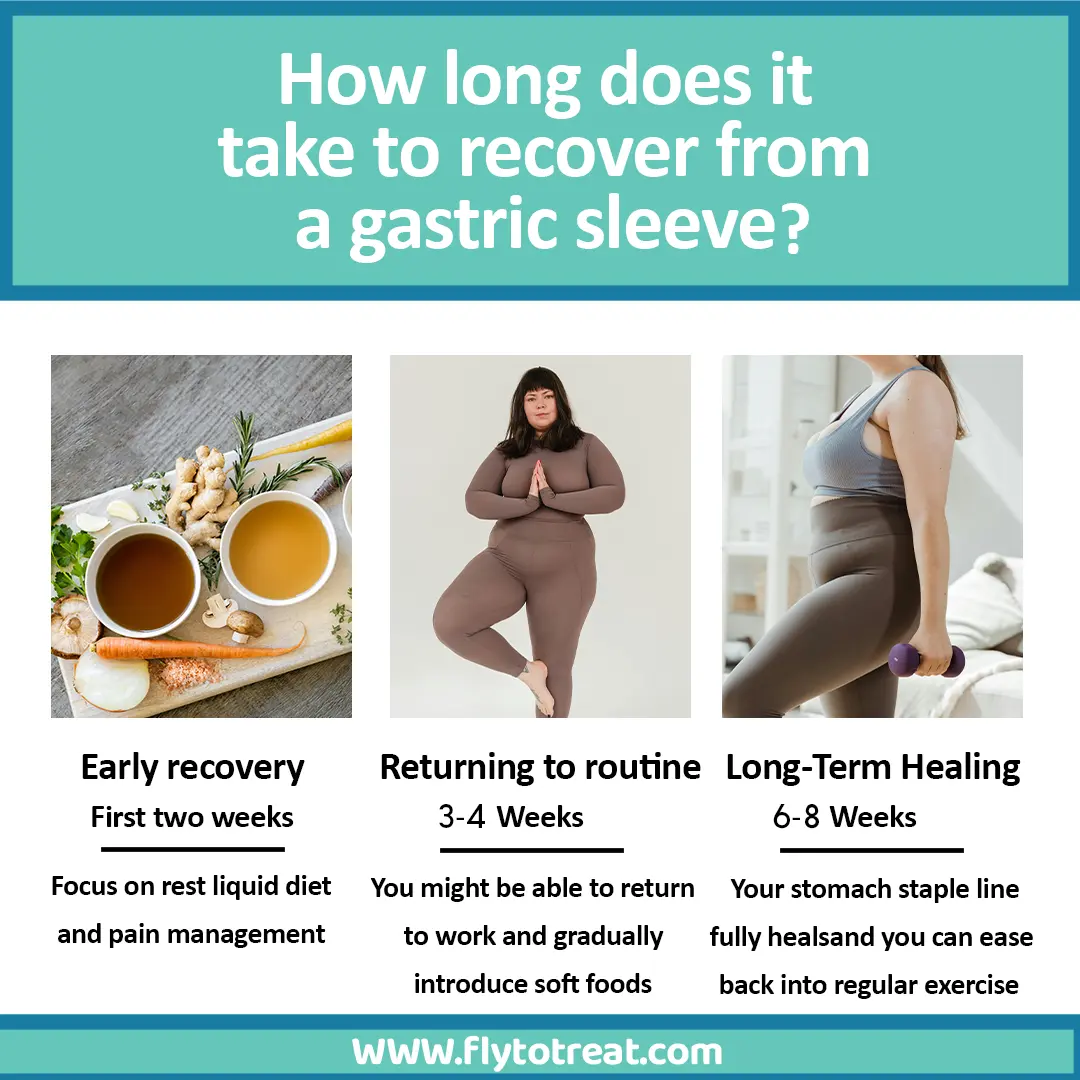
A Comprehensive Guide to Lifestyle After Gastric Sleeve Surgery
Navigating life after gastrectomy presents a journey of transformation and adaptation for those who undergo this significant medical procedure. As individuals embark on this path, they confront a spectrum of changes and challenges that extend beyond the physical alterations to encompass dietary, emotional, and lifestyle adjustments. This article explores the life after gastric sleeve surgery for those who plan to undergo gastric sleeve surgery. From understanding the initial recovery process to embracing a new nutritional regime, and from the psychological adjustments to the long-term implications on activities and habits, we delve into the core elements that define the post-operative experience. Our objective is to equip patients who want to undergo this surgery with the knowledge and guidance to explore this transformative phase, fostering a sense of normalcy, well-being, and empowerment in their journey toward a renewed self.
Will I ever feel normal again after gastric sleeve?
Wondering when you'll regain a sense of yourself in life after the gastric sleeve? Most patients experience a period of adjustment following surgery. This can involve changes in eating habits, digestion, and energy levels.
The timeframe for returning to "normal" varies depending on your recovery. However, within a few weeks to a few months, most people report feeling energized and comfortable with their new eating habits. Remember, a healthy lifestyle post-surgery is key to long-term success. Consult your doctor for guidance on returning to your usual activities and achieving a "normal" that feels good for you.
How long does it take to recover from a gastric sleeve?
Following gastric sleeve surgery (gastrectomy), recovery is a gradual process. While the initial discomfort subsides within a few weeks, full recovery takes some time.
Early Recovery (1-2 weeks): Focus on rest, liquid diet, and pain management.
Returning to Routine (3-4 weeks): You might be able to return to work and gradually introduce soft foods.
Long-Term Healing (6-8 weeks): Your stomach staple line fully heals, and you can ease back into regular exercise.
This is a general timeline, and individual experiences may vary. It's crucial to listen to your body and follow your doctor's guidance for a smooth life after bariatric surgery.

Life span after gastric sleeve surgery
Studies suggest that life after the gastric sleeve can positively impact life expectancy. Here's how:
• Reduced Health Risks: Obesity is linked to various health problems like heart disease, diabetes, and some cancers. By promoting weight loss, gastric sleeve surgery may decrease the risk of these conditions, potentially extending lifespan.
• Improved Health Outcomes: Following surgery, many patients experience better control of weight-related health issues, leading to a potentially longer and healthier life.
• Increased Life Expectancy: Research suggests that bariatric surgery can increase life expectancy by several years compared to individuals with severe obesity receiving traditional care.
A healthy lifestyle post-surgery is key. While gastric sleeve surgery can be a powerful tool, maintaining a balanced diet and regular exercise are crucial for maximizing its long-term benefits and potentially enjoying a longer and healthier life.
Can you get pregnant after gastric sleeve?
Absolutely! Pregnancy is possible in your life after bariatric surgery. However, planning is key. Experts recommend waiting 12-24 months after surgery to allow your body to stabilize weight and optimize nutrient absorption.
This timeframe ensures your body has adequate nutrients to support both you and your developing baby. During pregnancy, close monitoring by your doctor and a registered dietitian is crucial to ensure proper nutrition for you and your baby's health.
Planning for Parenthood:
If you're considering pregnancy after gastric sleeve surgery, consult your doctor to discuss the ideal timeline and any necessary adjustments to your diet and prenatal care plan. With careful planning and medical support, you can enjoy a healthy pregnancy in your life after gastric sleeve.
gastric sleeve and sleep apnea
For many people with sleep apnea, life after the gastric sleeve can be a significant relief. Sleep apnea occurs when excess tissue around the airway blocks breathing during sleep.
Significant weight loss achieved through gastric sleeve surgery can dramatically reduce this excess tissue. Studies show that sleeve surgery can improve or even resolve sleep apnea in up to 80% of patients. This translates to better sleep quality, increased energy levels, and a reduced risk of health complications associated with untreated sleep apnea.
Life after the gastric sleeve often involves adjustments to your sleep routine. If you are wondering how to sleep after gastric sleeve, Opt for sleeping on your back or side, as these are considered the optimal sleeping positions. It's common for surgeons to advise sleeping in a recliner during the initial weeks of your life after the gastric sleeve to alleviate discomfort. If you typically sleep on your stomach, it's advisable to adjust your sleep position beforehand to become accustomed to the new posture and ensure a smooth transition in your life after gastrectomy.
Important to Note:
While gastric sleeve surgery can be a powerful tool, it's not a guaranteed cure for sleep apnea. Consulting a doctor to determine if you're a candidate and discussing potential post-surgical sleep studies is crucial.
Diet after gastric sleeve
in the life after the gastric sleeve, a significant dietary shift is necessary. Here's a glimpse into what you must consider:
• Focus on more Protein: Prioritize protein-rich foods like lean meats, fish, and eggs at every meal. Consuming protein can aid in reducing hunger and promote muscle maintenance while losing weight.
• Small, Frequent Meals: Multiple small meals and snacks throughout the day are recommended to avoid discomfort and ensure proper nutrient intake.
• Hydration is Key: Drinking plenty of water is crucial to prevent dehydration, especially during the initial liquid diet phase.
• Limited Sugary Drinks and Processed Foods: Sugary drinks and processed foods offer minimal nutrients and can cause dumping syndrome (unpleasant digestive issues). Opt for whole, unprocessed foods for optimal health.
Remember: This is a general guideline, and a registered dietitian can create a personalized plan considering your preferences and nutritional needs. Following a healthy diet is essential for successful weight loss and long-term well-being in your life after bariatric surgery. It is best to incorporate a healthy lifestyle when you are getting prepared for gastric sleeve.
What can't you do after gastric sleeve?
• Short-Term Restrictions: Immediately after surgery, you'll likely be on a clear liquid diet, progressing to soft foods and eventually regular meals. Lifting heavy objects and strenuous exercise are also typically restricted for a while.
• Long-Term Dietary Changes: Your reduced stomach size necessitates a shift towards smaller, more frequent meals. Highly processed foods, sugary drinks, and excessive portions can cause discomfort or digestive issues (dumping syndrome).
Here's a breakdown of some specific things to avoid:
• Overeating: While you may feel hunger pangs initially, it's important to listen to your body's cues and stop eating when you feel comfortably full.
• Sugary Drinks and Processed Foods: Forbbiden food after sleeve include these food have minimal nutrients and can cause digestive problems. Opt for water and whole, unprocessed foods for optimal health.
• Carbonated Beverages: The carbonation can cause bloating and discomfort.
• Alcohol after gastric sleeve : Alcohol can irritate the stomach lining and hinder nutrient absorption. It's best to consult your doctor about alcohol consumption after surgery.
• Smoking: To heal quickly after surgery and avoid complications, avoid smoking and vaping any substance, including tobacco, tobacco-like products, and cannabis. They can harm your heart and lungs, hindering the recovery process and can increase the risk of developing stomach ulcers after bariatric surgery.
• Caffeinated drinks: During the initial 30 days post-surgery, it's advisable to steer clear of caffeine. If you have a fondness for coffee or caffeinated tea, you can gradually reintroduce these beverages into your diet after this period, pending approval from your surgeon.
Conclusion
Life after gastrectomy requires significant lifestyle adjustments, including dietary modifications and mental resilience. If you want to undergo gastric sleeve surgery, you must take a holistic approach, combining physical care with emotional support and lifestyle adaptations. If you need more personalized information, feel free to consult with our professional consultants. Lean on medical professionals, nutritionists, and support networks. Embrace the journey with patience and positivity to rediscover strength, redefine your relationship with food, and achieve lasting well-being.
MEDICALLY REVIEWED BY: Dr. Ali Bazazi
AUTHOR: FlytoTreat's team of Authors
12 March 2024 - Updated At: 29 May 2024
Related Articles
Comment





